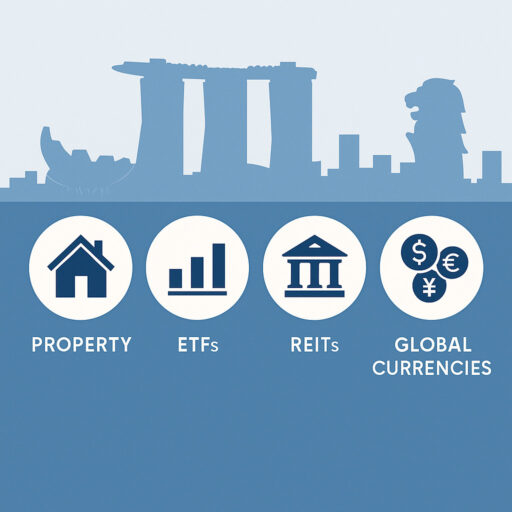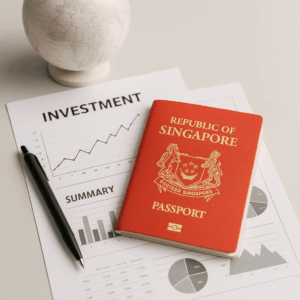What are the best investment options for Singapore expats?
Most Singaporeans living abroad balance investments between Singapore-based assets for stability and offshore portfolios for growth and currency diversification.
The best Singapore expat investment options typically include Central Provident Fund or CPF-linked products, Singapore unit trusts, S-REITs, global ETFs, and foreign currency portfolios.
For those considering expat investing in Singapore, it’s essential to understand how tax residency, CPF management, and global diversification intersect.
My contact details are hello@adamfayed.com and WhatsApp +44-7393-450-837 if you have any questions.
The information in this article is for general guidance only. It does not constitute financial, legal, or tax advice, and is not a recommendation or solicitation to invest. Some facts may have changed since the time of writing.

Investing as a Singapore expat
For Singaporean expats, investing abroad is as much about structure and compliance as it is about performance.
Because Singapore doesn’t impose capital gains and foreign income tax under certain conditions, expats enjoy more freedom in structuring and managing their wealth internationally.
These advantages make investing in Singapore for foreigners and Singaporeans alike a highly attractive option within Asia’s financial landscape.
However, expats must plan carefully to avoid double taxation in their country of residence.
Key considerations for Singaporean expats include:
- Whether to retain CPF savings in Singapore.
- How to manage multi-currency investments while minimizing exchange-rate losses.
- Ensuring investments abroad are regulated and tax-compliant in both Singapore and the host country.
- Using Monetary Authority of Singapore or MAS-approved financial advisors or licensed offshore platforms to manage global exposure.
How to invest as a Singapore expat
There are several ways for Singaporeans living overseas to invest efficiently:
- Open a Global Investment Account:
Certain banks and investment providers offer global investment accounts that allow you to trade international stocks, ETFs, and bonds in multiple currencies. - Use Offshore Investment Platforms:
Reputable offshore platforms based in hubs like Hong Kong, London, or the Isle of Man allow long-term expats to access diversified portfolios, mutual funds, and insurance-wrapped investments. - Consider Global Real Estate:
Property investments in key cities such as Sydney or London provide income diversification and potential appreciation outside the Singapore dollar. - Work with an International Financial Advisor:
An advisor experienced with Singapore expats can structure compliant offshore portfolios, manage estate planning, and ensure your investments align with your tax obligations.
Is investing in Singapore worth it for expats?
Yes, maintaining some level of investment in Singapore remains attractive for expats because of its political stability, strong currency (SGD), and transparent regulations.
However, domestic yields tend to be modest due to low inflation and interest rates. That’s why many Singaporean expats diversify abroad, seeking higher returns or specific exposures unavailable in the local market.
If you plan to return to Singapore or maintain financial roots there, keeping part of your assets in SGD makes sense.
Otherwise, combining domestic holdings with offshore investments provides better risk balance and global prospects.
What are the best investment options in Singapore for expats?
Investing in Singapore for foreigners is straightforward and transparent. Foreign investors can freely invest in stocks, unit trusts, bonds, and REITs through MAS-regulated brokers or fund platforms.

However, property investment is more regulated:
- Foreigners can buy condominiums and strata-titled apartments without approval.
- Buying landed property (like bungalows or terrace houses) requires special approval from the Singapore Land Authority.
- Commercial real estate is generally open to foreign ownership.
Foreign investors are attracted to Singapore’s strong currency, political stability, and absence of capital gains tax, making it a hub for global wealth management.
Best investments for Singapore residents
For residents living and working in Singapore, the best investments blend tax-efficient retirement tools with diversified portfolio options.
Top choices include:
- CPF Investments: Guaranteed returns and the option to invest a portion through the CPF Investment Scheme.
- Supplementary Retirement Scheme (SRS): Offers tax deductions while allowing investment in ETFs, bonds, and unit trusts.
- SGX Blue-Chip Shares & ETFs: Provide stable, dividend-paying exposure to Singapore’s largest companies.
- REITs: For consistent passive income and inflation protection.
- Global Index Funds: Allow Singaporeans to access US, Europe, and Asia-Pacific markets at low cost.
These suit residents who want steady returns in a low-risk, highly regulated market.
What are the alternative investments in Singapore?
The best investment options for expats in Singapore outside of conventional choices include private equity, venture capital, green funds, REITs, and collectibles like watches.
These options appeal to investors looking for higher-risk, higher-return opportunities beyond stocks and bonds.
The Monetary Authority of Singapore (MAS) actively supports private-market and sustainable investing through initiatives that encourage innovation and green finance.
Best Offshore Investments for Singapore Expats
The best Singapore expat investment options often extend beyond local markets. They include multi-currency accounts, offshore bonds, global ETFs, international pensions, overseas real estate, and trusts.
These assets help protect wealth against currency risk, provide access to international markets, and simplify succession planning.
Popular jurisdictions for Singaporeans include Hong Kong, Guernsey, and the Isle of Man, which offer tax-efficient structures and strong investor protection.
Best Alternative Investments for Singaporean Expats Abroad
For Singaporeans living overseas, the best alternative investments are private equity funds, global real estate portfolios, hedge funds, ESG projects, and citizenship-by-investment programs.
These opportunities help diversify assets geographically while building global access and mobility.
Expats with higher risk appetite may also explore venture capital and structured products tied to international markets.
Offshore Structures for Singapore Expats
The most common offshore structures for Singapore expats are trusts and holding companies, typically set up in low-tax jurisdictions to manage cross-border wealth.
These structures can protect assets, reduce administrative complexity, and enhance privacy, but they must comply with Inland Revenue Authority of Singapore (IRAS) and MAS reporting requirements.
Professional advice is essential to ensure legal and tax optimization.
Singapore Tax Residency Rules
Singapore taxes residents only on income earned within the country.
- Tax residents are taxed on local income.
- Foreign-sourced income is usually exempt unless remitted to Singapore.
- Non-residents pay a flat rate on Singapore-sourced income.
This territorial system makes Singapore one of the most tax-efficient countries for both residents and returning expats.
Do I have to pay tax in Singapore if I live abroad?
If you live abroad and don’t remit income to Singapore, you generally don’t pay tax on that foreign income.
Only income from Singapore-based work, business, or rentals remains taxable.
Singapore’s Double Tax Agreements (DTAs) prevent double taxation on income earned in another country.
What happens to your investments when you move abroad from Singapore?
When you move overseas, you can keep your Singapore investments such as REITs, ETFs, and unit trusts.
Before relocating, update your tax residency status, review CPF and SRS withdrawal rules, and assess whether to diversify into other currencies.
Engage an offshore wealth advisor to ensure compliance and maintain balanced exposure between Singapore and global markets.
Pained by financial indecision?

Adam is an internationally recognised author on financial matters with over 830million answer views on Quora, a widely sold book on Amazon, and a contributor on Forbes.



